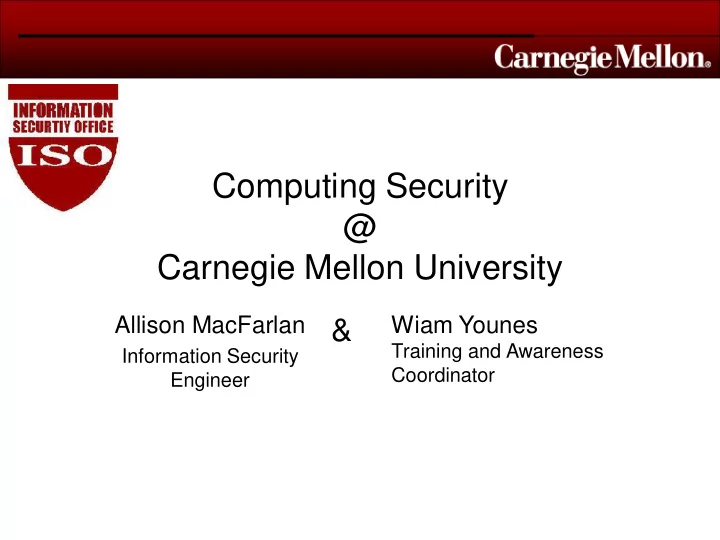

Computing Security @ Carnegie Mellon University Allison MacFarlan Wiam Younes & Training and Awareness Information Security Coordinator Engineer
Five Computing Security Tips
Back to the Basics • Patching • Antivirus and anti-malware software • Strong passwords • Back up your data • Be aware of Theft – your computer, your account • Read our Policies and Guidelines • Take advantage of our tools: Identity Finder, Anti-Phishing Phil
What’s infecting the Campus now • Zeus – acquired from phish messages, causes spamming, steals banking credentials. • Gozi – Russian mafia, sets up proxy, connects to botnet, banking. • Torpig – identity stealer, reboots the computer, lodges in the MBR, hidden.
Why are computers getting compromised? • Unpatched Adobe products and java. • Facebook involved 50% of the time. • Downloading exploits with P2P. • Clicking on e-mail objects. • Passing around infected USBs.
Be Afraid • CMU is a big target (reputation). • People inside are always trying out new hacker tools on this network. • People from other countries want your credentials to get Library/other resources. • 51% of Tepper students participating in a phish study fell for phishing attempts on day one (IDtheft study, 4/2009).
Theft • Bring your computer to the bathroom. It will be stolen from the Library. • Register your computer and bike with the CMU Police http://www.cmu.edu/police/programsandservices/crime-prevention.html • BACK YOUR DATA UP REGULARLY.
Stats • Big network: 10 GB core, via PSC/3ROX and two Commodity Feeds. • Two public Class Bs plus a few misc. slivers for .org and remote sites. SEI walled off. • Five kerberos realms, seven AFS cells. • Depending on the day, between 45,000 and 60,000 devices.
What ISO sees • Signatures, flows, logs. • Only the most egregious stuff, and not all of it. • What people report to us. • We pay much more attention to administrative systems.
What you can do • Take advantage of the antivirus/anti- malware software on Computing Services’s site http://www.cmu.edu/computing/software/all/index.html • Act like you’re going to graduate school at a Hacker conference.
Questions? Information Security Office (ISO) iso@andrew.cmu.edu www.cmu.edu/iso 412-268-4357
Recommend
More recommend